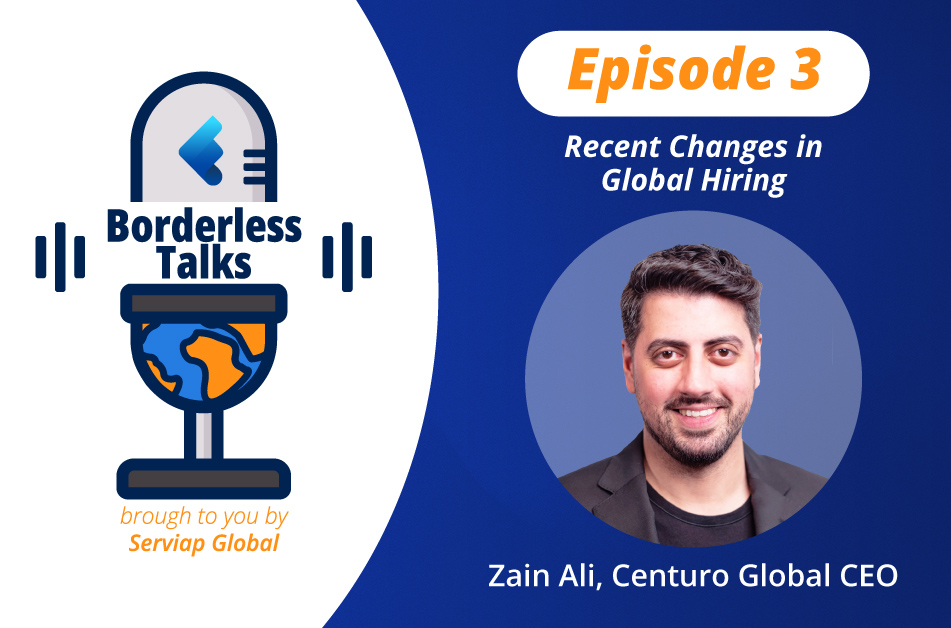Table of Contents
How to Hire Employees in Argentina?
There are two ways to hire employees in Argentina. The first one is to hire employee with a Global Professional Employer Organization, or PEO, such as SERVIAP. The second one is by your own. You need to make an offer letter determining if the salary is This will cost more time and money than the first one.
Labor Contracts
There is an employment relationship when a person voluntarily and personally develops tasks for another natural person or company, under their dependency, receiving compensation in return. The Labor Contract Law in Argentina presumes that if the above conditions are met, even if the parties – worker and employer – do not enter into a written employment contract, there will be an employment relationship, generating for both parties all the rights and obligations of established by law.
Types of contracts in Argentina
It is presumed that employment contracts have an indefinite term unless there is a specific legislation that indicates otherwise.
| Contract for an Indefinite timeArticle 99, Law 20744 |
The employment contract shall be deemed to be concluded for an indefinite period, unless its term results from the following circumstances:a) That the time of its duration has been set expressly and in writing; The formalization of contracts for a determined period in successive form, which exceeds the requirements provided in section b) of this article, converts the contract into one for an indefinite period of time. |
| Contract for specific work or time.Article 102, Law 20744 | The fixed-term work contract will last until the expiration of the agreed period, and cannot be celebrated for more than five (5) years. |
| Season ContractArticle 105, Law 20744 | There will be a seasonal employment contract when the relationship between the parties, originated in permanent needs of the company or exploitation, is fulfilled at certain times of the year only and is subject to being repeated for a given period due to the nature of the activity. |
| Temporary Work ContractArticle 108, law 20744 | Regardless of its denomination, it will be considered to be an eventual work contract when the activity of the worker is exercised under the dependence of an employer for the satisfaction of concrete results. It will also be understood that such relationship mediates when the link begins and ends with the completion of the work, the execution of the act or the provision of service for which the worker was hired. |
Basic Requirements
The information that the contract must contain is established in the Article 56 of the Law 20744.
- Name of the worker.
- Marital status.
- Date of entry and exit.
- Remunerations assigned and received.
- Individualization of persons that generate the right to the perception of family allowances.
- Other data that allow an exact evaluation of the obligations under their charge.
Payroll in Argentina
The payroll is one of the most important documents within a company, since there is a control of all the withholdings, by law and additional, of the salary of the employees. From this operation, the final amount that a worker will receive and the amount that the company will invest in a given period is obtained.
Law Benefits in Argentina
The additional benefits to which the worker becomes a creditor by belonging to a labor relationship, the benefits are born in the contractual relationship and will be independent of salary, they may consist of an economic, cultural, or medical nature, the law establishes mandatory benefits that every employer must grant to his employees, the others will be agreed mutually in the individual work contract.
The role that labor benefits play is that they are always aimed at improving the living conditions of workers, reducing their expenses and granting them incentives that foster their cultural and social development.
| Benefits | Brief description |
| SalaryArticle103, Law 20744 | It is understood as the compensation that the employee must receive as a result of the employment contract. Said remuneration may not be less than the minimum wage. The employer owes the worker the remuneration, even if he does not provide services, simply because he has put his work force at his disposal. |
| VacationsArticle 150, Law 20744 | The worker will enjoy a minimum and continuous period of paid annual rest for the following periods: YearsDays1 – 5 years 14 days of vacation5 – 10 years 21 days of vacation10 – 20 years 28 days of vacationGreater than 20 years 35 days of vacation |
| Vacation Bonus Article 16, Law 20744 |
The worker will receive compensation during the holiday period, which will be determined as follows, the employee will receive 25% of the salary for the days given. The remuneration corresponding to the holiday period must be paid upon its initiation of vacation period. |
| Supplementary Annual Salary (Christmas Bonus) Article 121 and 122, Law 20744 |
Supplementary annual salary is understood a 13th paid month, received by the worker in the respective calendar year. It will be paid in two installments: the first one on June thirty and the second on December thirty-first of each year. |
| Special Leaves Article 158 Law 20744 |
The worker will enjoy the following special leaves:a) Maternity Leave: By birth of a child, two (2) calendar daysb) By marriage, ten (10) calendar daysc) Due to the death of the spouse or the person with whom he was united in apparent marriage, under the conditions established in this law; of children or parents, three (3) calendar days.d) Due to the death of a brother, one (1) daye) To take an exam in secondary or university education, two (2) consecutive days per exam, with a maximum of ten (10) days per calendar year.The licenses referred shall be paid. |
Workday and holidays
Workday is the time during which the worker is available to the employer to lend his service.
The worker and the employer will set the duration of the workday, without exceeding the legal maximum of 8 Hour per day, 48 Hour per week.
For every six days of work the employee must enjoy a rest day, at least.
The work day may also be extended due to extraordinary circumstances:
- Maximum 3 Hour per day (in a week it can not exceed 8 hours of overtime)
- Maximum 30 Hours per Month
- Maximum 200 Hours per Year
| Type of Work Day | Working hours per Day | Over Time | Sundays |
| Day shift | 8 Hours | An additional 50% of the salary | The employee will be entitled to 100% over salary on Saturdays after 13 pm, Sundays and holidays. |
| Night Shift | 7 Hours | ||
| unhealthy and or dangerous work | 6 Hours |
In the Law 27.399 it is established the holidays and mandatory day off, there are 2 days that do not apply to everyone except a specific group of workers:
- Law No. 26,199 issued in commemoration of the genocide suffered by the Armenian people. Employees and officials of public sector and students of Armenian origin are allowed to freely dispose of April 24 of each year to attend and participate in activities carried out in commemoration of the tragedy that affected their community. Provincial governments are invited to adhere to the provisions of this law.
- Only for inhabitants who profess the Jewish religion, provided by Article 2 of Law 27,399.
| Día/ Date | Nombre de festividad/ Holiday Name |
| January 1st | New Year |
| March 4th | Carnaval |
| March 5th | Carnaval |
| March 24th | National Day of Remembrance for Truth and Justice |
| April 2nd | Veterans Day and those killed in the Falklands War |
| April 19th | Holy Friday |
| May 1st | Labors Day |
| May 25th | May Revolution Day |
| June 20th | Day Pass to the Immortality of General Manuel Belgrano |
| July 9th | Independence Day |
| December 8th | Immaculate Conception |
| December 25th | Christmas |
Employee Termination
Once the employment contract has begun, neither party can dissolve it without prior notice.
| Worker on: | Minimum Days of notice |
| Probation | 15 days |
| From 3 months to 5 years | 1 month |
| From 5 years and on | 2 months |
Labor termination causes
The employment contract will end in the following cases:
- Mutual agreement of the parties.
- Resignation of the worker, giving notice to his employer thirty days in advance, at least.
- Death of the worker.
- Expiration of the term agreed in the contract. The duration of the fixed term contract can not exceed one year.
- Conclusion of the work or service that gave rise to the contract.
- Fortuitous event or force majeure
Labor termination settlement or Compensation:
If the contract has been valid for a year or more and the employer terminates with out a just cause, the worker must be paid a compensation for the years of service.
- 30 days of salary for each year of service and fraction greater than 6 months, with a maximum of 330 days
- The payment of the notice days, if they where not given the prior notification
- Proportional vacations not taken
If the employee was contracted by a specific work or task, and the relation ends before, they will have the following compensation:
- 2.5 days of remuneration for each month worked, and fraction greater than 15 days
The settlement, resignation and mutual agreement must be established in writing. The settlement must be granted by the employer and made its payment available to the worker within ten business days, counted from the separation of the worker.
The employment contract ends without the right to compensation when the employer terminates it by invoking one or more of the following causes
- Some of the misconduct of a serious nature, duly proven, that are indicated below:
a) Lack in the performance of their duties
b) Sexual harassment behaviors
c) Injuries issued by the worker to the employer
e) Immoral conduct of the worker that affects the company where he works
f) Workplace harassment behaviors
- Negotiations executed by the worker within the business and that have been prohibited.
- Non-attendance of the employee to his work without just cause for two days in a row.
- Abandonment of work by the worker, understood as such:
a) The untimely and unjustified departure of the worker from the job site and during working hours, without the permission of the employer or his representative.
b) The refusal to work without justified cause in the tasks agreed in the contract.
- Acts or recklessness that affect the safety or operation of the establishment, the safety or activity of the workers, or their health.
- The material damage caused intentionally in the facilities, machinery, tools, work tools, products or merchandise.
- Serious breach of the obligations imposed by the contract.
Why to choose PEO in Argentina?
The recruitment process will be carried out taking into account from the beginning with the skills and characteristics you need for this new member of your team. At SERVIAP, in addition to saving time and money, you will have a customer service manager dedicated to your account. You will be able to use NYRN Cloud where you will find personalized attention and all the information, reports from your employee.






























